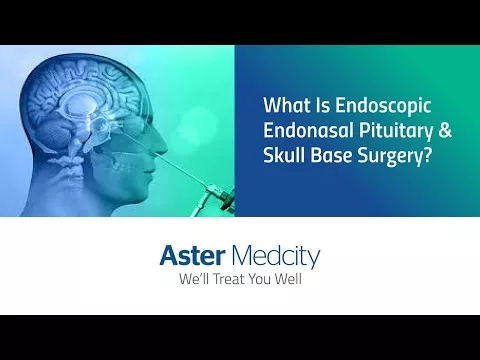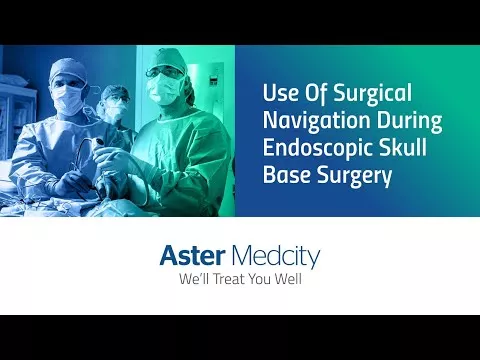What is Endoscopic Skullbase Surgery?
Endoscopic skull base surgery is a minimally invasive surgical technique that is used to remove tumors or other lesions that are located at the base of the skull or in the brain. The procedure is performed through the nostrils using an endoscope. The endoscope allows the surgeon to see inside the skull without making large incisions or removing a portion of the skull.
This type of surgery is often used to treat conditions such as pituitary tumors, meningiomas, craniopharyngiomas, and chordomas. It is also used to treat conditions that cause cerebrospinal fluid (CSF) leaks, such as skull fractures or tumors that erode the bone at the base of the skull.
Endoscopic skull base surgery offers several advantages over traditional open surgery, including shorter hospital stays, less pain and scarring, and faster recovery times.
Why and when Endoscopic Skullbase Surgery is recommended?
Endoscopic skull base surgery may be recommended for a variety of conditions that affect the base of the skull or brain. Some common reasons why this type of surgery may be recommended include:
- Tumors: Endoscopic skull base surgery can be used to remove tumors that are located at the base of the skull or in the brain, such as pituitary tumors, meningiomas, craniopharyngiomas, and chordomas.
- CSF leaks: If there is a tear or hole in the lining of the brain or spinal cord, cerebrospinal fluid (CSF) can leak out, leading to a variety of symptoms. Endoscopic skull base surgery can be used to repair the tear and prevent further leakage.
- Sinus and nasal disorders: Endoscopic skull base surgery can be used to treat conditions that affect the sinuses and nasal passages, such as sinonasal cancers, invasive fungal infections.
- Skull base trauma: If the base of the skull is fractured with CSF leak, endoscopic skull base surgery may be used to repair the damage.
The decision to recommend endoscopic skull base surgery will depend on the specific condition and individual patient factors.
How is Endoscopic Skullbase Surgery different from the conventional treatment?
Endoscopic skull base surgery is different from conventional treatments in several ways:
- Minimally invasive: Endoscopic skull base surgery is a minimally invasive procedure that is performed through the nostrils using an endoscope. This means that there are no large incisions or removal of a portion of the skull, resulting in less pain, scarring, and a faster recovery time.
- Improved visualization: The endoscope used in endoscopic skull base surgery provides a high-definition view of the area being operated on, allowing for more precise surgical maneuvers and better visualization of small or hard-to-reach areas.
- Less tissue disruption: Because endoscopic skull base surgery is minimally invasive, there is less disruption from retention of surrounding tissue, resulting in less bleeding, less swelling, and a faster recovery time.
- Shorter hospital stay: Patients who undergo endoscopic skull base surgery typically have a shorter hospital stay compared to those who undergo conventional brain surgery.
- Fewer complications: Because endoscopic skull base surgery is less invasive, there is a lower risk of complications, such as infection or nerve damage.
In summary, endoscopic skull base surgery offers several advantages over conventional treatments, including a minimally invasive approach, improved visualization, less tissue disruption, shorter hospital stay, and fewer complications.
How is life after Endoscopic Skullbase Surgery?
The recovery and long-term outcome after endoscopic skull base surgery will vary depending on the specific condition being treated and individual patient factors. However, in general, patients can expect to experience some discomfort, swelling, and fatigue in the first few days after surgery. Pain medication and other supportive therapies may be used to manage these symptoms.
During the recovery period, patients may need to follow certain restrictions, such as avoiding strenuous physical activity or blowing their nose, to allow the surgical site to heal properly. It is important to follow all post-operative instructions given by the surgeon to ensure the best possible outcome.
In most cases, patients can return to their normal activities within a few weeks after surgery. However, it may take 2-3 months for full recovery.
Overall, the long-term outcome after endoscopic skull base surgery can be very positive, with many patients experiencing a significant improvement in their symptoms and quality of life. Regular follow-up appointments with the surgeon will be necessary to monitor the healing process and ensure that the condition does not return.
Blogs
The source of trustworthy health and medical information. Through this section, we provide research-based health information, and all that is happening in Aster Hospital.







